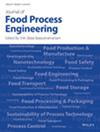Study of the Relationship Between Electrical Conductivity, Batter–Crumb Transition, and Leavening Powders During the Ohmic Baking of Pound Cake
Abstract
Ohmic heating (OH) is a promising technology in the food industry, with electrical conductivity (EC) playing a crucial role in its effectiveness. This study aimed to correlate the evolution of EC during pound cake baking using OH with the degree of starch gelatinization (DSG) and assess the impact of two sodium acid pyrophosphate leavening acids—SAPP10 and SAPP40—on EC. Baking was conducted in a prototype OH cell, and EC was measured in two ways: during baking as a function of increasing temperature, and at specific baking times and temperatures at the cake center. The latter was measured using impedancemetry at room temperature and correlated with the DSG determined by differential scanning calorimetry. Key results showed a clear negative correlation between EC and the DSG in the center of the OH-baked cake. Specifically, as the DSG increased from 4% at 60°C to about 48% at 76°C, EC decreased from 390 μS/cm to approximately 89 μS/cm, respectively. Importantly, the addition of different baking powders did not significantly affect EC evolution. These findings suggest that the relationship between EC and starch gelatinization in cakes is influenced by moisture content and ion mobility during baking. This study highlights the potential of EC monitoring as a tool to track internal changes in cakes during the OH process, offering valuable insights into how baking conditions can influence final product characteristics like texture and quality.

 求助内容:
求助内容: 应助结果提醒方式:
应助结果提醒方式:


